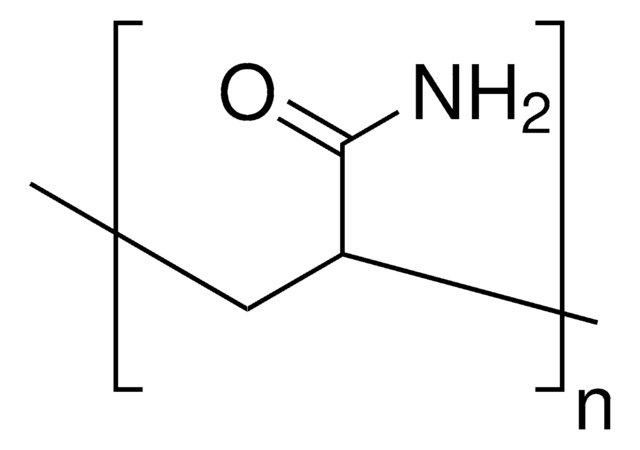92560
Polyacrylamide
nonionic water-soluble polymer
Synonyme(s) :
2-Propenamide, Acrylamide polymer, Polyacrylic
About This Item
Produits recommandés
Niveau de qualité
Forme
solid
Poids mol.
Mw 5,000,000-6,000,000
Pf
246-250 °C
InChI
1S/C3H5NO/c1-2-3(4)5/h2H,1H2,(H2,4,5)
Clé InChI
HRPVXLWXLXDGHG-UHFFFAOYSA-N
Vous recherchez des produits similaires ? Visite Guide de comparaison des produits
Application
- Proteomic analysis and lethality of the venom of Aegaeobuthus nigrocinctus, a scorpion of medical significance in the Middle East.: This study explores the proteomic composition and toxicity of the venom from the Aegaeobuthus nigrocinctus scorpion, utilizing polyacrylamide gel electrophoresis to analyze venom proteins. The findings contribute to understanding the venom′s biochemical properties and potential medical implications (Borges et al., 2024).
- Protocol for isolating small cytosolic dsDNA from cultured murine cells.: This protocol paper details a method for isolating small cytosolic double-stranded DNA using polyacrylamide gel electrophoresis, which is critical for studying DNA-protein interactions and genetic regulation in murine cell models (Dai et al., 2024).
- Comparative study of the commonly used protein quantitation assays on different Hymenoptera venoms: A fundamental aspect of Hymenoptera venom proteome analysis.: This comparative study evaluates various protein quantitation assays, including those using polyacrylamide gel electrophoresis, to standardize venom protein analysis from different Hymenoptera species, aiding in venom research and potential therapeutic applications (Wanandy et al., 2024).
Code de la classe de stockage
11 - Combustible Solids
Classe de danger pour l'eau (WGK)
WGK 2
Point d'éclair (°F)
Not applicable
Point d'éclair (°C)
Not applicable
Équipement de protection individuelle
Eyeshields, Gloves, type N95 (US)
Certificats d'analyse (COA)
Recherchez un Certificats d'analyse (COA) en saisissant le numéro de lot du produit. Les numéros de lot figurent sur l'étiquette du produit après les mots "Lot" ou "Batch".
Déjà en possession de ce produit ?
Retrouvez la documentation relative aux produits que vous avez récemment achetés dans la Bibliothèque de documents.
Les clients ont également consulté
Notre équipe de scientifiques dispose d'une expérience dans tous les secteurs de la recherche, notamment en sciences de la vie, science des matériaux, synthèse chimique, chromatographie, analyse et dans de nombreux autres domaines..
Contacter notre Service technique







